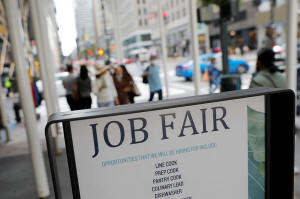Morning Bid: Ebbing jobs fear sees calmer market waters
 Send a link to a friend
Send a link to a friend
 [August 09, 2024] A
look at the day ahead in U.S. and global markets from Mike Dolan [August 09, 2024] A
look at the day ahead in U.S. and global markets from Mike Dolan
The first reality check on July's jarring U.S. employment report
suggests rising recession fears were overstated, allowing stocks to claw
back nearly all the week's withering losses and volatility gauges to
subside to more normal levels.
It's been a hair-raising ride, but Thursday's 2.3% jump in the S&P500
marked its best single day in more than 18 months and brought the losses
for the week so far to a modest 0.5%. While that would still mark the
longest weekly losing streak in almost a year, Friday has yet to play
out.
Villains of the week's piece, the VIX fear gauge of stock volatility and
Japan's yen both calmed down - the former to within 4 points of its
30-year mean and the latter to settle just above 147 per dollar.
But the unexpectedly large drop in weekly U.S. jobless claims was the
clear trigger for Thursday's rally. And that now biases the debate about
July's worrying unemployment rate rise toward rising labour force
participation and weather-related quirks, rather than outsize job
shedding per se.
With a thin diary on Friday and next week's U.S. July inflation report
now on the radar, futures market have turned more equivocal about
whether next month's expected Federal Reserve rate cut will be a quarter
or a half point.

Some 38 basis points of easing are now priced for September, with 100
bps over the remainder of the year. Ten and 30-year Treasuries shrugged
off the week's weak auctions and yields on both slipped again on Friday,
the 10 year subsiding back below 4%.
Fed policymakers seem increasingly confident that inflation is cooling
enough to allow rate cuts ahead.
"All the elements of inflation seem to be settling down," said Richmond
Fed boss Thomas Barkin. "I'm relatively hopeful based on the
conversations I'm having that that's going to continue."
Futures on Wall Street's main stock indexes were all up between 0.5% and
1% before Friday's open.
Despite some wild single stock moves through the bumpy earnings season,
LSEG data shows annual profit growth for the S&P500 tracking 13.8% for
the second quarter - two points higher that pre-season estimates.
Eli Lilly was the standout on Thursday. Its shares jumped almost 10%
after the drugmaker raised its annual profit forecast as sales of its
popular weight-loss drug Zepbound crossed $1 billion for the first time
in a quarter.
As eyes drift back to the inflation picture, China's deflation scare
eased somewhat as consumer prices stayed positive at an above-forecast
0.5% last month.
But to the extent that Chinese producer prices matter more for inflation
around the world, the continued annual deflation in factory gate prices
may be more significant.

[to top of second column] |

Signage for a job fair is seen on 5th Avenue after the release of
the jobs report in Manhattan, New York City, U.S., September 3,
2021. REUTERS/Andrew Kelly/File Photo

In the slipstream of Wall Street's surge on Thursday, stocks in
Europe and Japan gained ground today too - the latter closing the
week down just over 2% after an eye-watering 10%-plus round-trip on
Monday and Tuesday.
China's mainland benchmark underperformed and closed slightly in the
red.
In deals, British investment platform Hargreaves Lansdown agreed to
a 5.44 billion pound ($6.94 billion) takeover by an international
consortium, which is betting on grabbing market share in the
increasingly competitive UK wealth market.
Elsewhere U.S. politics continued to throw a shade on the remainder
of the year.
Republican candidate Donald Trump said on Thursday that U.S.
presidents should have a say over Fed decisions, the most explicit
indication so far of his interest in infringing on the central
bank's independence should he regain the White House.
"I made a lot of money, I was very successful, and I think I have a
better instinct than in many cases, people that would be on the
Federal Reserve or the chairman."
And yet opinion polls and betting markets suggest he may not get the
chance to act that out after November's election.
Democrat Kamala Harris leads Trump 42% to 37% nationwide, according
to an Ipsos poll published on Thursday. And she is two points ahead
in the seven closest swing states, which are among a handful of
states likely to decide the election, according to another poll.
The PredictIt betting market site now puts the chances of Vice
President Kamala Harris beating Trump in November at about 57% - 11
points clear of the former president.

The first televised debate between the two is scheduled for
September 10.
Key developments that should provide more direction to U.S. markets
later on Friday:
* Canada July employment report, June industrial output
* US corporate earnings: AMC Networks, Evergy, EchoStar, Trade Desk,
Nikola etc
(By Mike Dolan, editing by Sharon Singleton; mike.dolan@thomsonreuters.com)
[© 2024 Thomson Reuters. All rights
reserved.]
This material may not be published,
broadcast, rewritten or redistributed.
Thompson Reuters is solely responsible for this content. |